A large part of Korea is covered with mountains, and you can find mountains, even in the middle of the largest cities. Naturally, mountain climbing has become locals' one of the most loved pastimes.
Let's learn about some of the best mountains to climb in Korea by their regions.
SEOUL
Seoul is one of the largest cities in the world, but you can find mountains standing tall along with the skyscrapers. These mountains are healing areas for residents and great places to enjoy the landscape of Seoul city.
| Location | 서을특별시 회현동1가 |
| Height | 270.85m |
| Difficulty | ☆☆☆☆★ |
| Starting Point | Myeongdong, Itaewon, Seoul Station, Chungmuro |
| Features | N Seoul Tower, Namsan Cable Car |
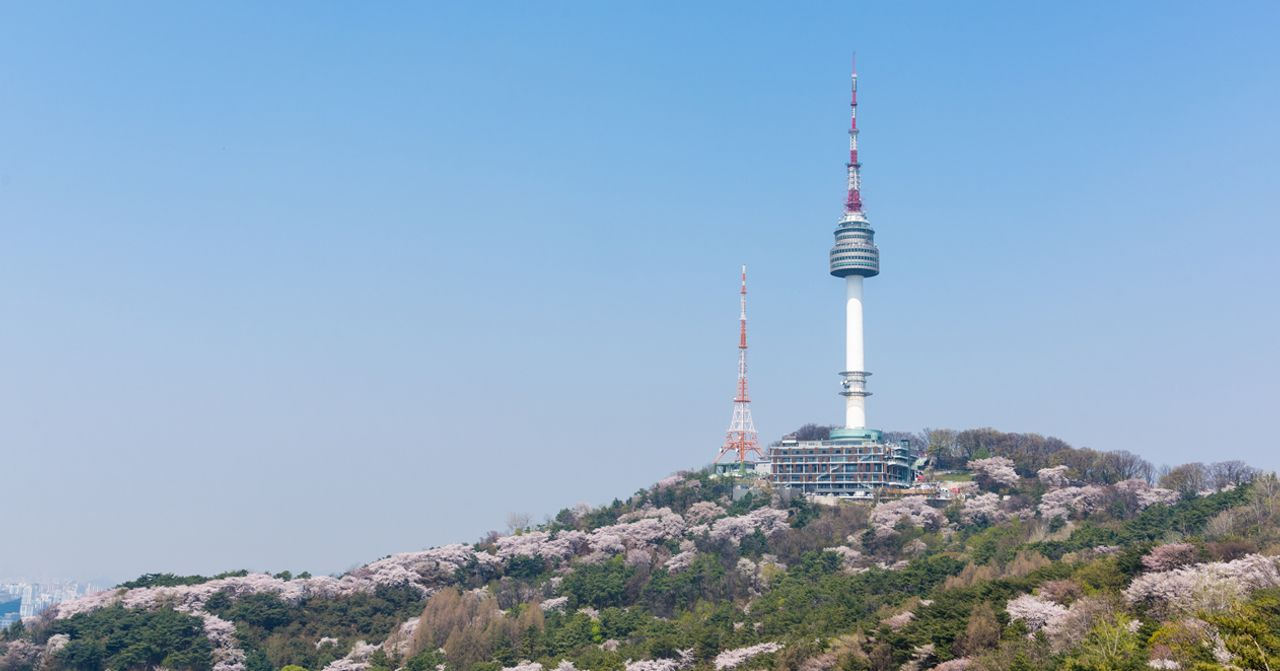
Namsan is more known for its N Seoul Tower and as a dating course. However, if you are willing to take a walk instead of the bus or the cable car, it offers a great nature trail. It is located right next to Myeongdong and Itaewon, and you can easily travel to the downtown areas after your hiking.
Gwanaksan
| Location | 서울특별시 관악구 신림동 |
| Height | 632m |
| Difficulty | ☆★★★★ |
| Starting Point | Seoul National University Station, Gwacheon Station, Sadang Station |
| Features | Yeonjudae, Yeonjuan Temple |
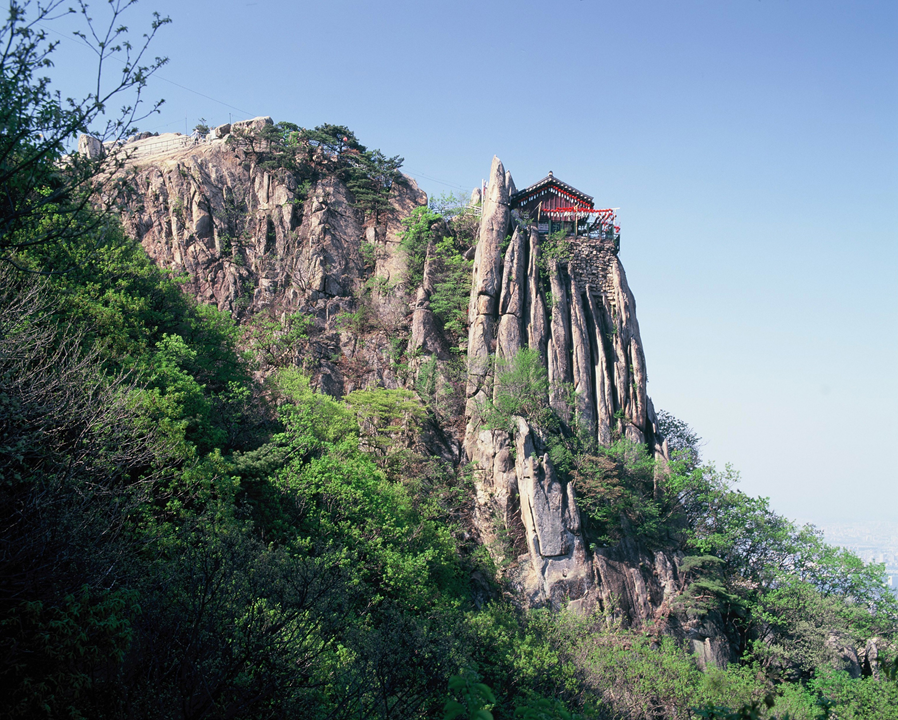
Gwanaksan is one of the most challenging mountains to climb in Seoul. It is a natural border for Seoul and Gwacheon, and you can start from the place that best suits you. It surrounds the Seoul National University, and you can find many trails that lead to the school.
If you are trying to get to the top, Yeonjudae, it's a tough climb, so you'd better gear up.
Inwangsan
| Location | 서울특별시 옥인동 |
| Height | 338m |
| Difficulty | ☆☆☆★★ |
| Starting Point | Gyeongbokgung Station, Dongnimmun Station, Muakjae Station |
| Features | Chimabawi Rock, Gyeongbokgung View |
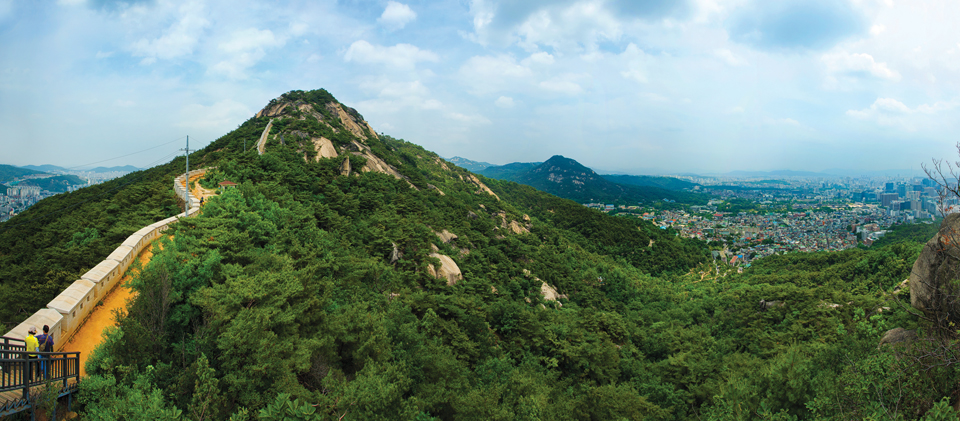 Inwangsan is one of the four mountains that surround Gyeongbokgung and protect it. It is located right next to the Seochon area which is a popular dating course for the beautiful cafes and galleries.
Inwangsan is one of the four mountains that surround Gyeongbokgung and protect it. It is located right next to the Seochon area which is a popular dating course for the beautiful cafes and galleries.
It's a rather easy climb, and you can easily get to it with public transportation. However, if you are expecting a grand natural forest, this isn't for you.
Bukhansan
| Location | 서울특별시 우이동 |
| Height | 836m |
| Difficulty | ☆★★★★ |
| Starting Point | Suyu Station, Bulgwang Station, Yeonsinnae Station |
| Features | Baekundae, Insubong |
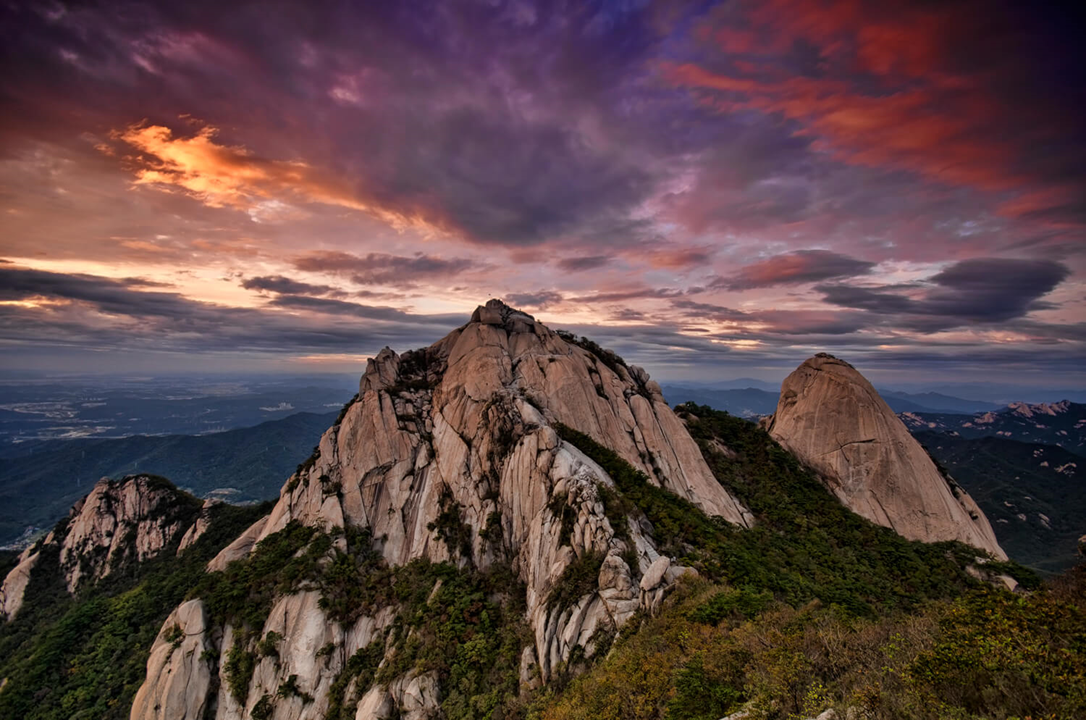
Bukhansan is one of the four mountains that protect the outer boundary of Seoul city. You might think it is a mild climb in Seoul, but Bukhansan is the mountain with the most accidents in Korea. It is loved by rock climbers, and you should choose Bukhansan if you have experienced extreme climbing.
Suraksan
| Location | 서울특별시 상계1동 |
| Height | 638m |
| Difficulty | ☆☆☆★★ |
| Starting Point | Suraksan Station, Danggogae Station, Jangam Station |
| Features | Seongnimsa |
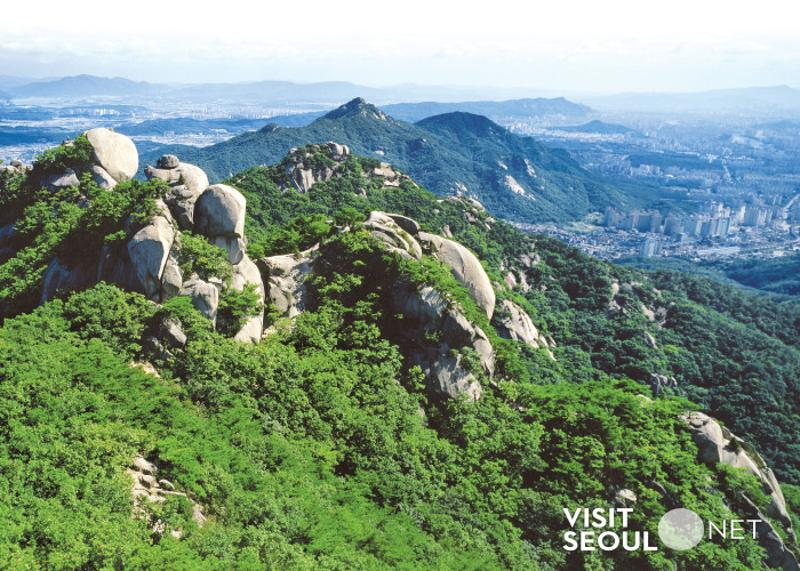
Source: visitseoul.net
Suraksan is the natural border for Seoul, Namyangju and Uijeongbu. It is a rocky mountain, but the trail is well prepared, and you can enjoy the splendid scenery rather safe and easy.
Dobongsan
| Location | 서울특별시 도봉1동 |
| Height | 740m |
| Difficulty | ☆☆★★★ |
| Starting Point | Dobongsan Station |
| Features | Mangwolsa, Sinseondae |
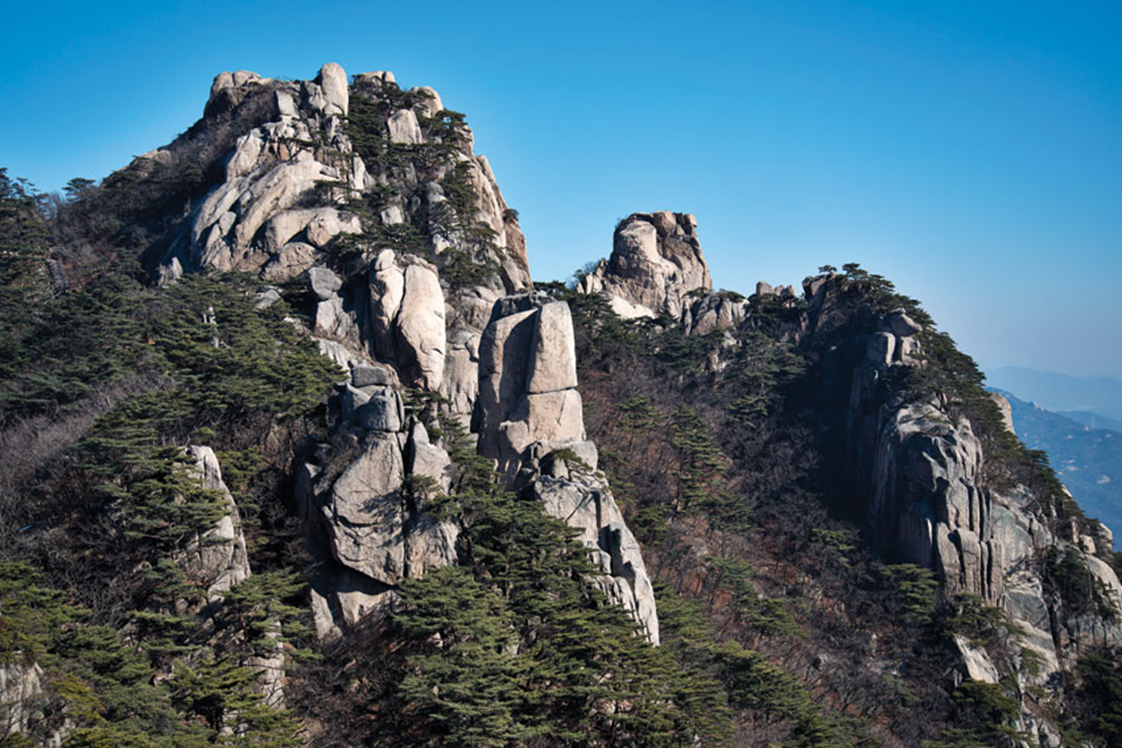
Dobongsan is located right next to Bukhansan and is a part of the Bukhansan National Park. Like Bukhansan, there are boulders to climb and is one of the hardest climbing you can find in Seoul. There are over 37 rock climbing courses for climbing lovers.
Cheonggyesan
| Location | 성남시 상적동 |
| Height | 620m |
| Difficulty | ☆☆☆☆★ |
| Starting Point | Cheonggyesan Station, Seoul Grand Park Station |
| Features | Maebong |
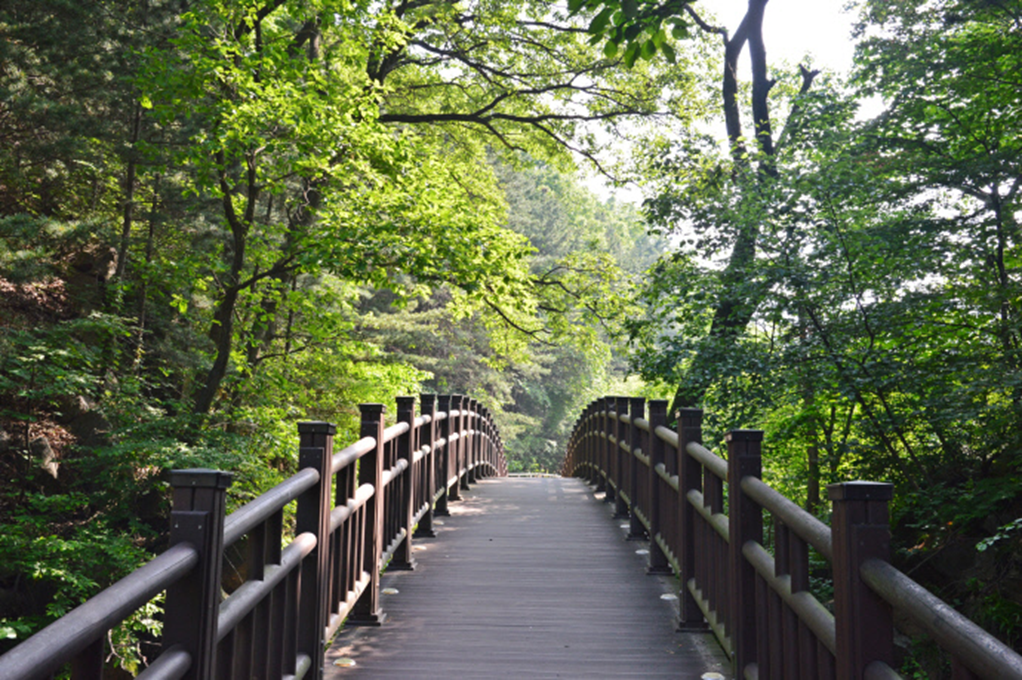
You can get to Cheonggyesan from Seocho, where there isn't much natural park nearby, and you can the mountain filled with people on weekends. Manggyeongdae is the peak, but because of a military facility, the Maebong is the highest you can get. The trail is very well built, so you don't have to worry about the difficulty.
Bulamsan
| Location | 남양주시 별내동 |
| Height | 507m |
| Difficulty | ☆☆☆☆★ |
| Starting Point | Taereung Station, Sanggye Station, Danggogye Station |
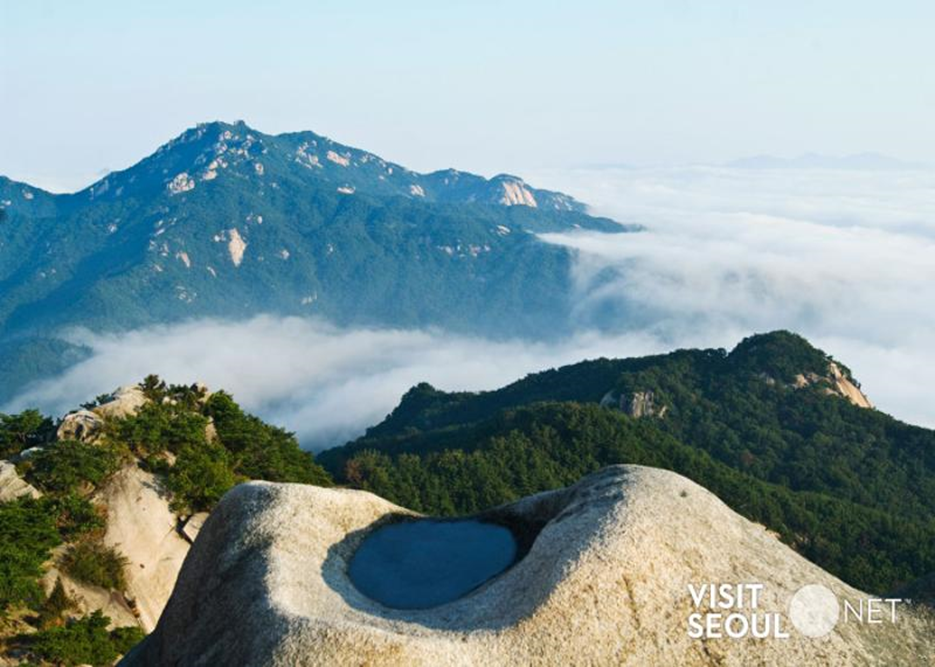
Source: visitseoul.net
Bulamsan is located right next to the Korean national team's training camp, and during the season you can find athletes running up and down the mountain. It's an easy climb up to the middle, but the top is rocky and steep, so be aware.
GYEONGGI, INCHEON
In Gyeonggi and Incheon area, you can find natural landscapes closest to Seoul. Mountains in Gyeonggi have relatively gentle slopes.
Manisan (Incheon)
| Location | 인천광역시 화도면 |
| Height | 469m |
| Difficulty | ☆☆☆★★ |
| Starting Point | Ganghwa Bus Terminal (3000, 3100 Bus) |
| Features | Chamseongdan Altar |
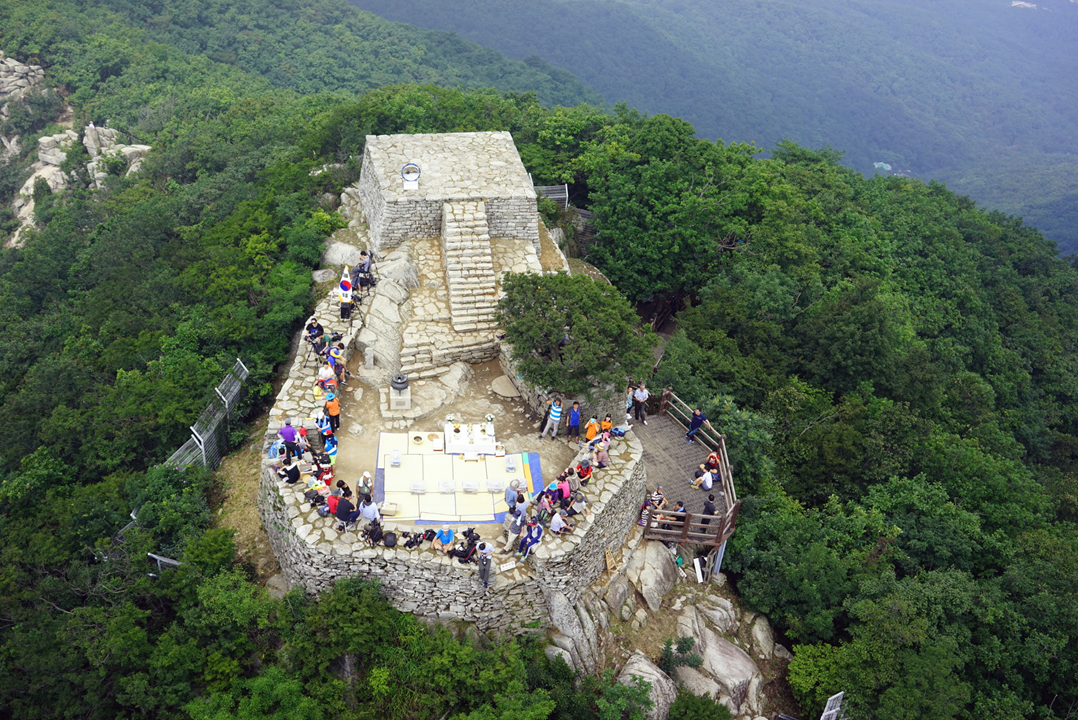
Source: Ganghwa-gun
Manisan is the highest mountain in Incheon, but what's more important is that there is an altar that Dangun (the leader of Gojoseon) used to perform rituals, called Chamseongdan. Its historic significance is very important in Korean culture.
Namhansan (Gwangju)
| Location | 광주시 중부면 |
| Height | 522m |
| Difficulty | ☆☆☆☆★ |
| Starting Point | Sanseong Station, Namahansanseong Station |
| Features | Namhansanseong |
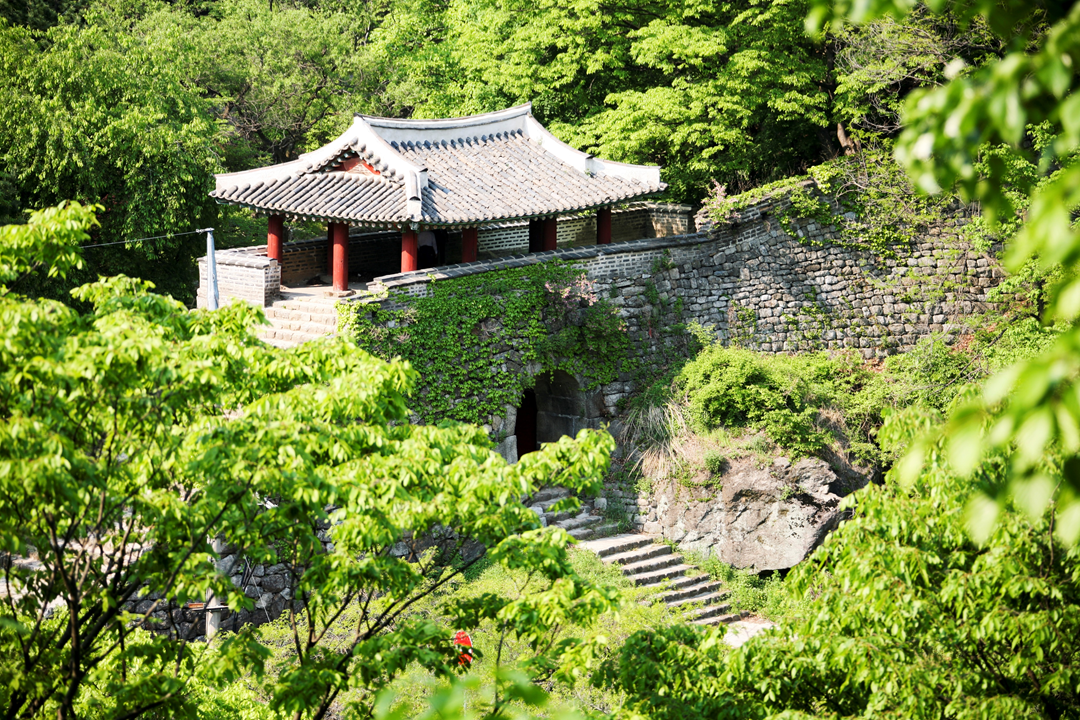
Namhansan is the place where Namhansanseong Fortress was built to defend against foreign invasions. It was designated by UNESCO for its history, and you can follow the trail along the fortress wall to appreciate its beauty.
Paldalsan (Suwon)
| Location | 수원시 고등동 |
| Height | 143m |
| Difficulty | ☆☆☆☆★ |
| Starting Point | Suwon Station → Hwaseong Temporary Palace Terminal |
| Features | Suwon Hwaseong |
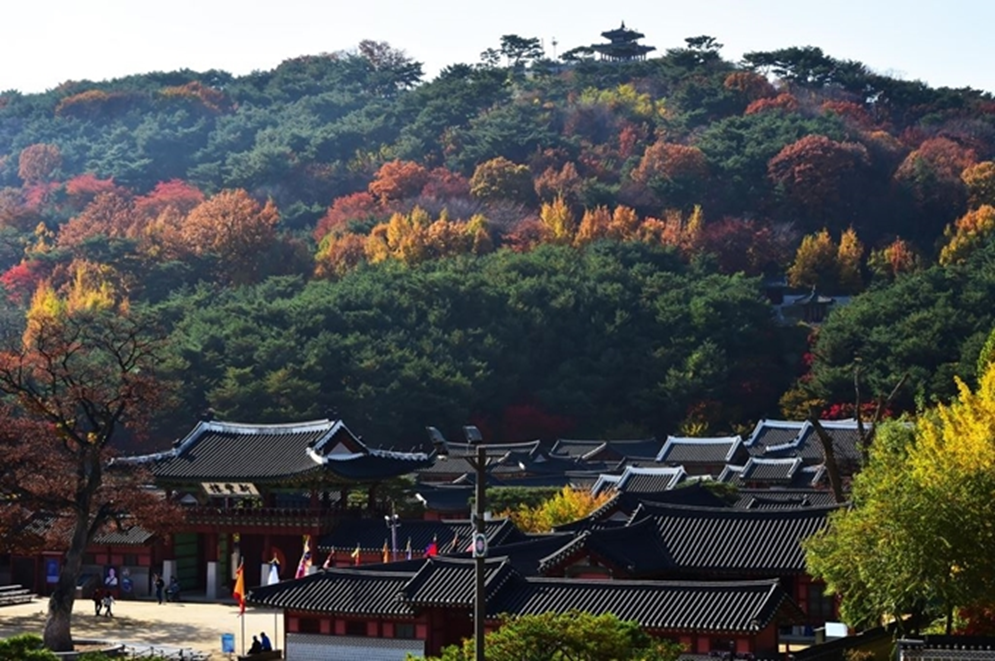
Paldalsan is located in the middle of Suwon city and is a small and gentle slope mountain. It's a place where Suwon Hwaseong was established and is one of the most popular dating course for locals. You can watch the whole Suwon City and Hwaseong Temporary Palace from the top.
Surisan (Anyang)
| Location | 안양시 안양9동 |
| Height | 475m |
| Difficulty | ☆☆★★★ |
| Starting Point | Surisan Station |
| Features | Surisa Temple, Surisan Shrine |
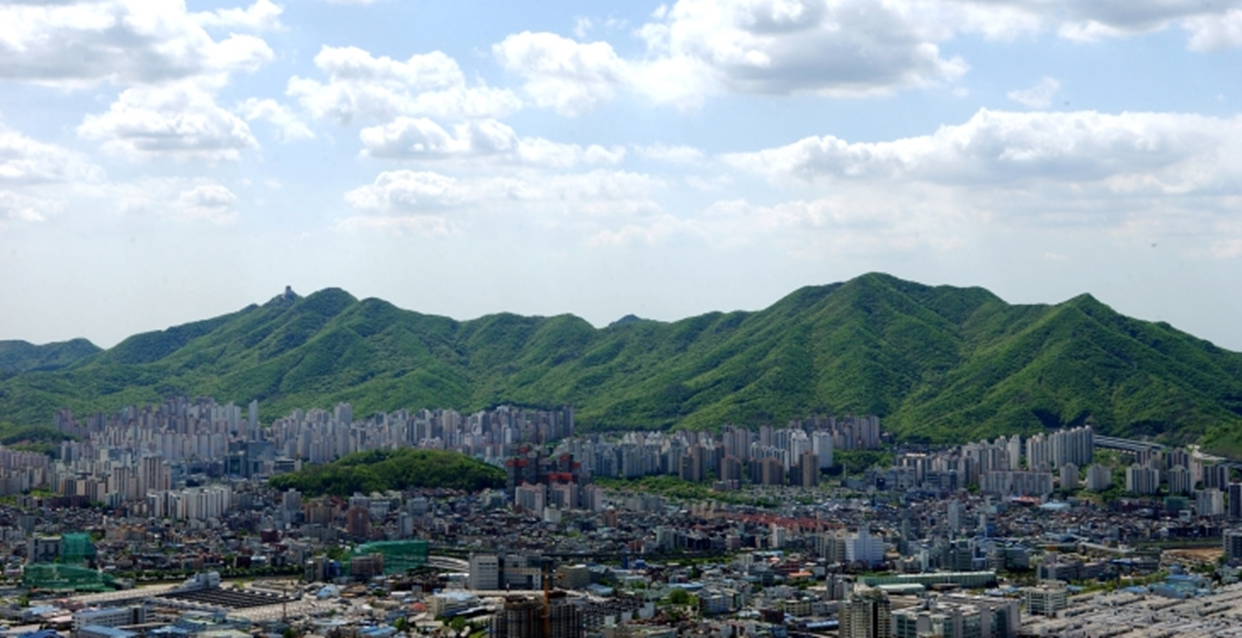
Surisan is located next to Gwanaksan and is loved by locals in Seoul and Gyeonggi-do because of its accessibility. A special thing about Surisan is that there are both a Buddhist temple and a Catholic Shrine in the mountain.
Soyosan (Dongducheon)
| Location | 동두천시 상봉암동 |
| Height | 536m |
| Difficulty | ☆★★★★ |
| Starting Point | Soyosan Station |
| Features | Jajaeam |
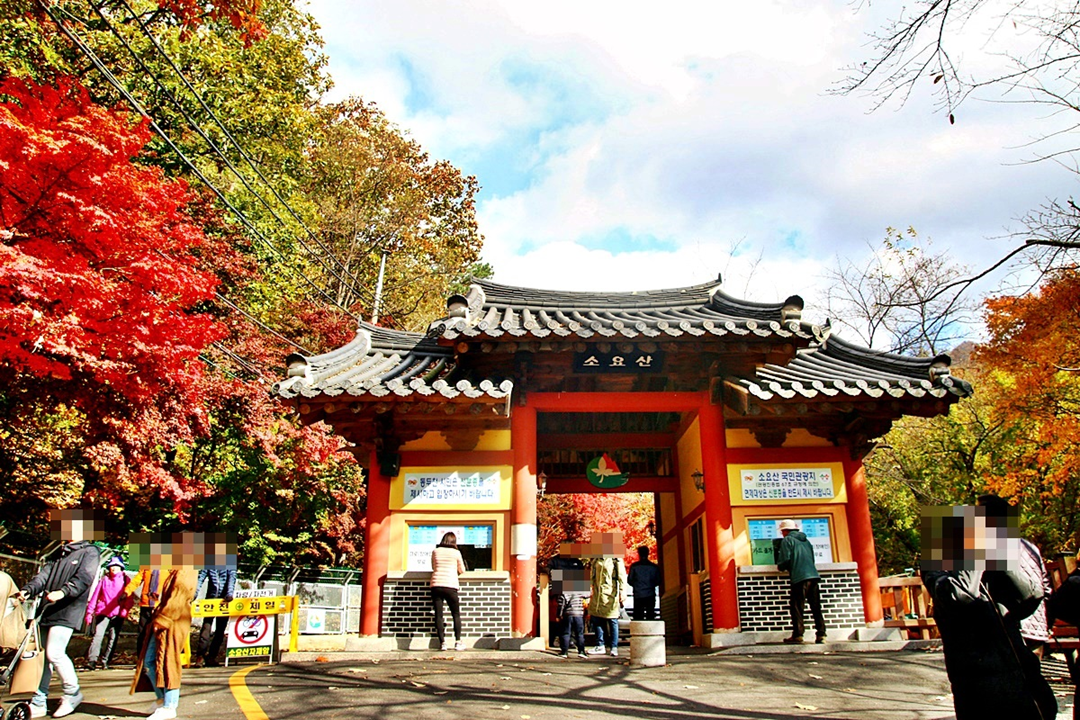
Soyosan is famous for flowers in the spring, and maple trees in autumn. It's easy to travel to by the subway and is a great place to go for a hiking within a day. Jajaeam Temple, located in Soyosan, was established by Master Wonhyo during the Shilla Dynasty era.
GANGWON-DO
Gangwon-do is a Korean region with the most spectacular natural landscape. Along with the vast ocean, the mountains in Gangwon-do create beautiful scenery that locals love. Mountains in Gangwon-do are generally tough to climb.
| Location | 강원도 인제군 북면 |
| Height | 1,708m |
| Difficulty | ☆★★★★ |
| Starting Point | Sokcho Terminal → Seoraksan Small Park Terminal |
| Features | Baekdamsa, Sinheungsa |
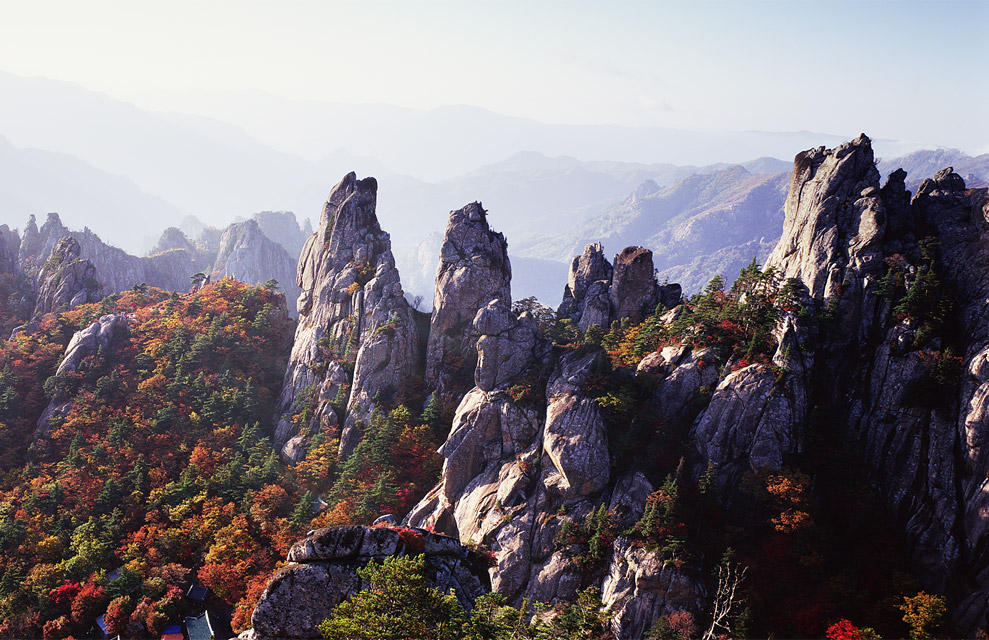
Seorak-san is the most renowned mountain in South Korea, along with Jirisan. It's not just high but is very steep with large boulders. If you are trying to climb Seoraksan, be sure to pack food, camping kits, and prepare your body at peak condition.
| Location | 강원도 평창군 진부면 |
| Height | 1,563m |
| Difficulty | ☆☆★★★ |
| Starting Point | Jinbu Terminal → Woljeongsa Terminal |
| Features | Woljeongsa Temple |
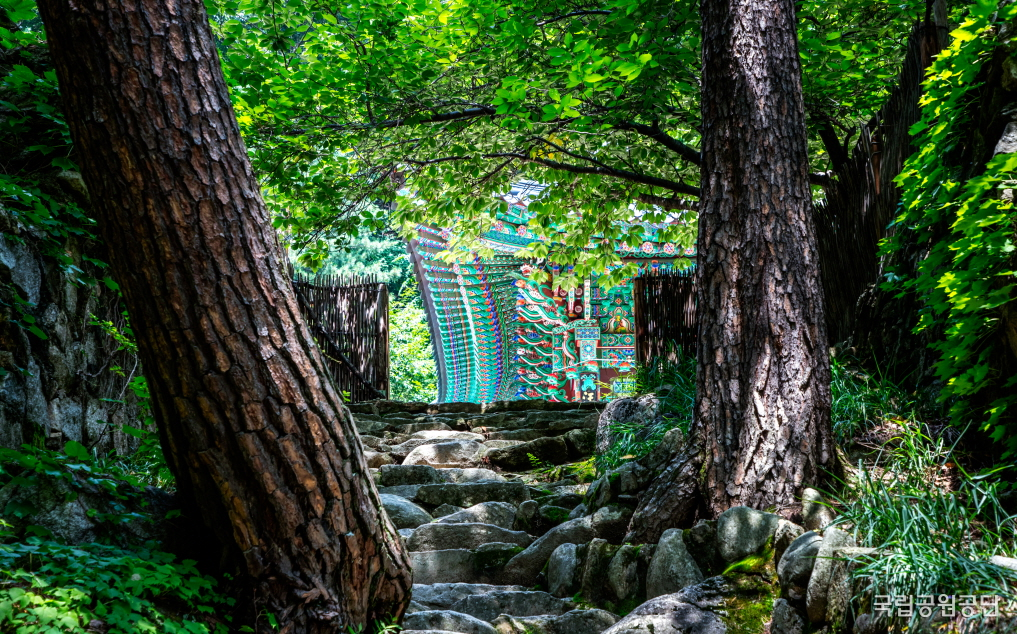
Source: Korea National Park
Odaesan is one of the higher mountains on the list and has beautiful scenery, which is often compared to that of Geumgangsan in North Korea. Because of the tranquil atmosphere of Odaesan, Woljeongsa has become the most popular temple for templestays.
| Location | 강원도 태백시 혈동 |
| Height | 1,567m |
| Difficulty | ☆☆☆★★ |
| Starting Point | Taebaek Station |
| Features | Janggunbong, Cheonjedan |
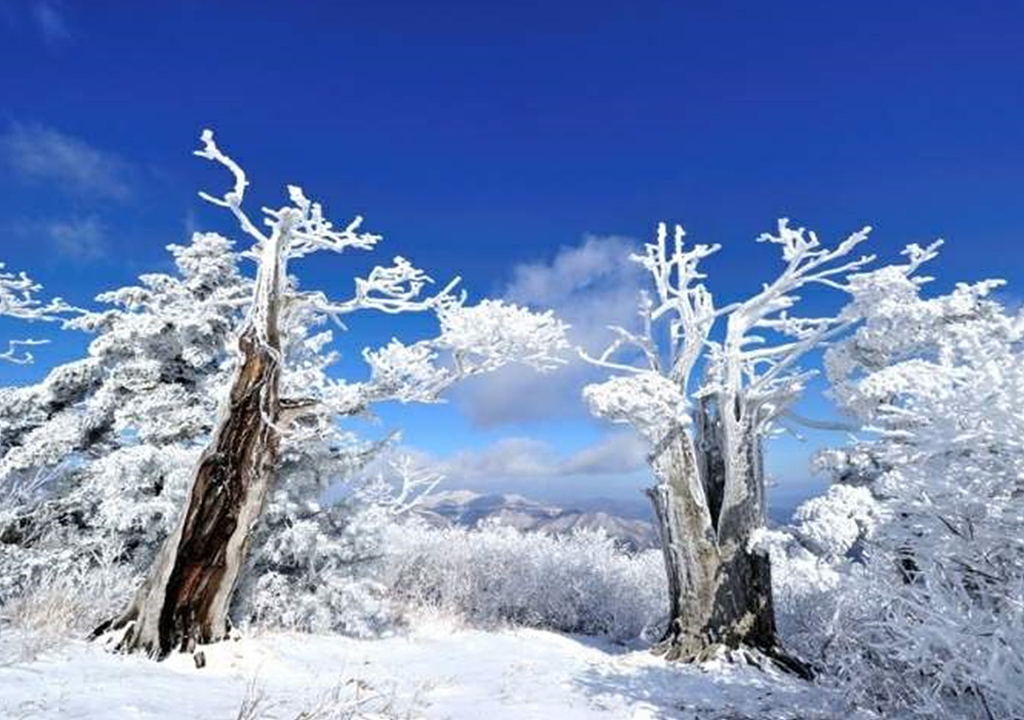
Gangwon-do is the snowiest region in Korea, and in winter, Taebaeksan is covered with thick snow. That's why Taebaeksan is the place where Korea's largest snow festival is held. Grand sculptures about Korean myths made of snow are something you can only find on Taebaeksan.
Chiaksan
| Location | 강원도 원주시 소초면 |
| Height | 1,288m |
| Difficulty | ☆☆★★★ |
| Starting Point | Wonju Station → Guryongsa Terminal |
| Features | Guryongsa Temple, Taejongdae |
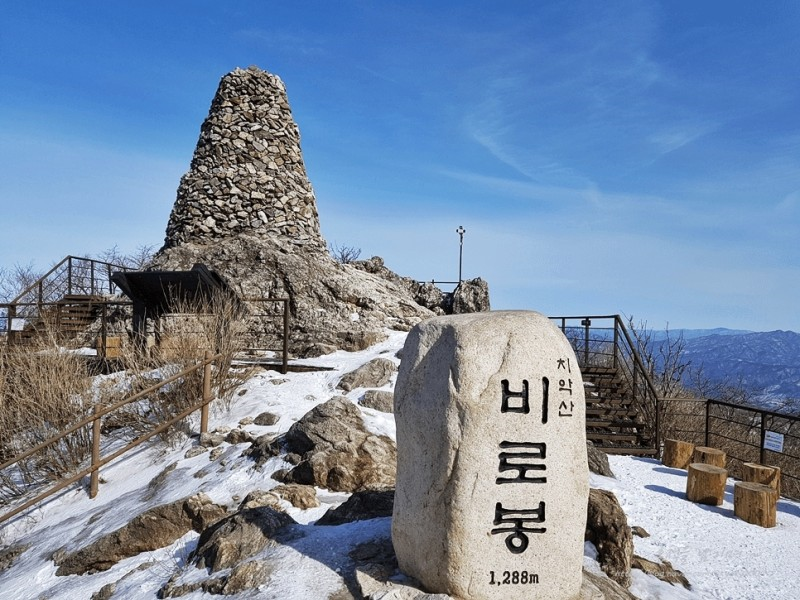
Chiaksan is a landmark of Wonju, which is the largest city of Gangwon-do. On the peak Birobong, three stone towers were built to pray for the prosperity and safety of Korea. You'll have to climb some steep stairs, so be aware.
Samaksan
| Location | 강원도 춘천시 서면 |
| Height | 654m |
| Difficulty | ☆☆☆★★ |
| Starting Point | Gangchon Station → Deugnseon Falls Terminal |
| Features | Deungseon Falls, Mountain Bike |
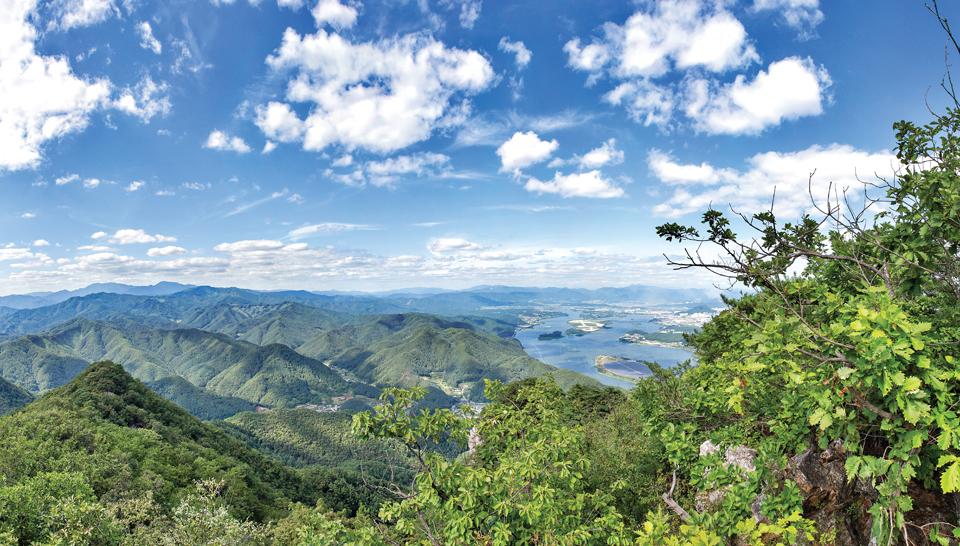
Chuncheon is known for its large lakes, and you can appreciate the natural landscape of the whole Chuncheon from Samaksan. Come down the hills, and you can enjoy extreme sports like mountain bikes or rafting that is famous in Chuncheon.
CHUNGCHEONG-DO
Chungcheongdo has a relatively flat plains, and there aren't as many named mountains. However, some mountains are believed to have holy meanings and are loved by many locals.
Chilgapsan
| Location | 충청남도 청양군 대치면 |
| Height | 561m |
| Difficulty | ☆☆☆☆★ |
| Starting Point | Cheongyang Terminal → Janggoksa |
| Features | Magoksa |
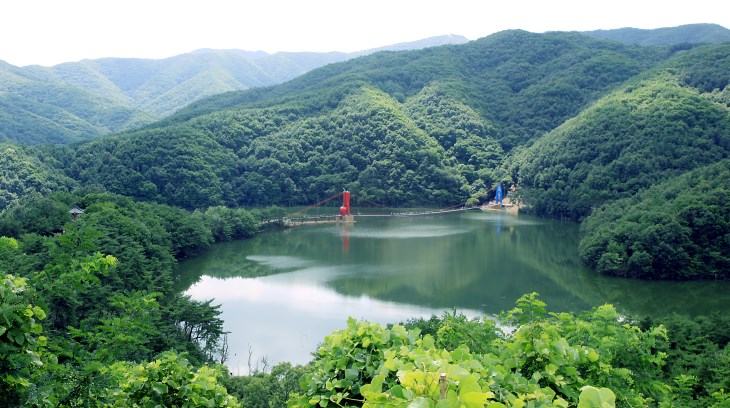
Chilgapsan is an easy mountain to climb, and it feels like more of a large hill than a mountain. Chilgapsan is famous for a popular song named after the mountain. The scenery with the river flowing in the middle is a rare sight.
Gyeryongsan
| Location | 충청남도 계룡시 신도안면 |
| Height | 845m |
| Difficulty | ☆☆★★★ |
| Starting Point | Hyeonchungwon Station → Donghaksa Terminal |
| Features | Donghaksa, Eunseon Falls |
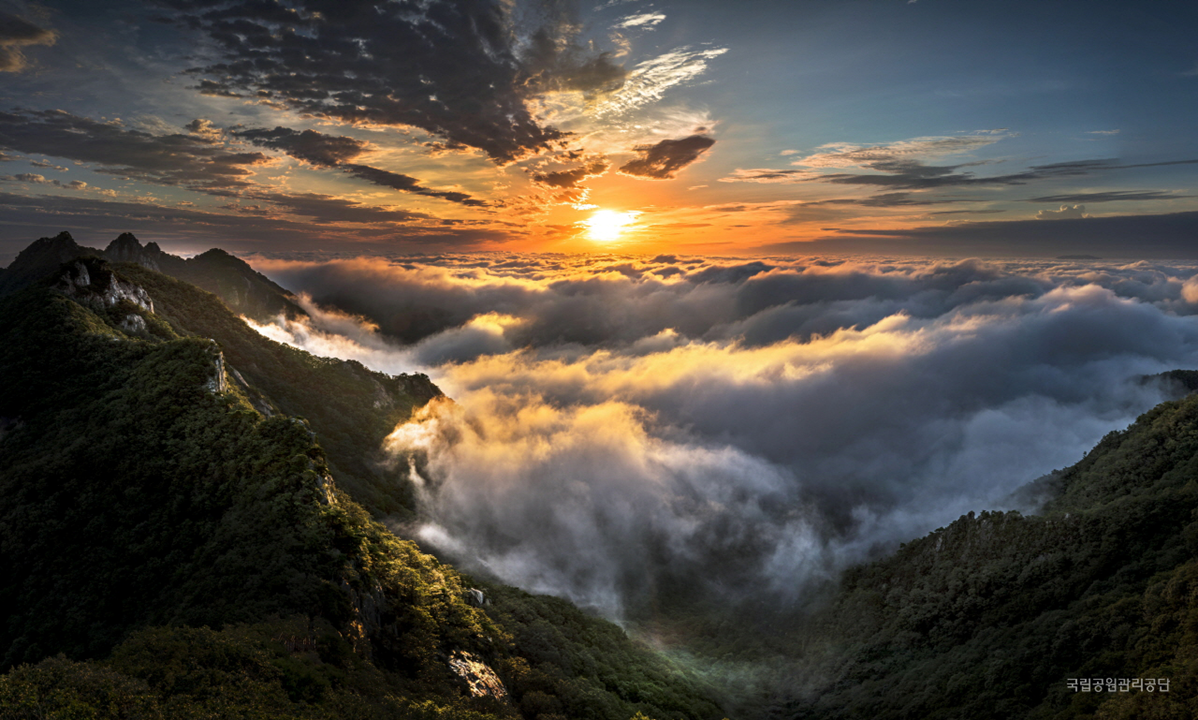
Gyeryongsan is known to have mystical energy flowing through it, and you can find many shamans meditating. It's located close to Daejeon and is easy to visit, but the trail is quite tough to climb, so be prepared.
JEOLLA-DO
Jeolla-do is also famous for its vast plains, but also it is located at the end of mountain chains and has many celebrated mountains. If you are travelling in Jeolla-do, visit some of the best temples and the mountains that surround them.
Jogyesan (Suncheon)
| Location | 전라남도 순천시 송광면 |
| Height | 884m |
| Difficulty | ☆☆☆★★ |
| Starting Point | Suncheon Station → Seonamsa Terminal |
| Features | Seonamsa, Songgwangsa |
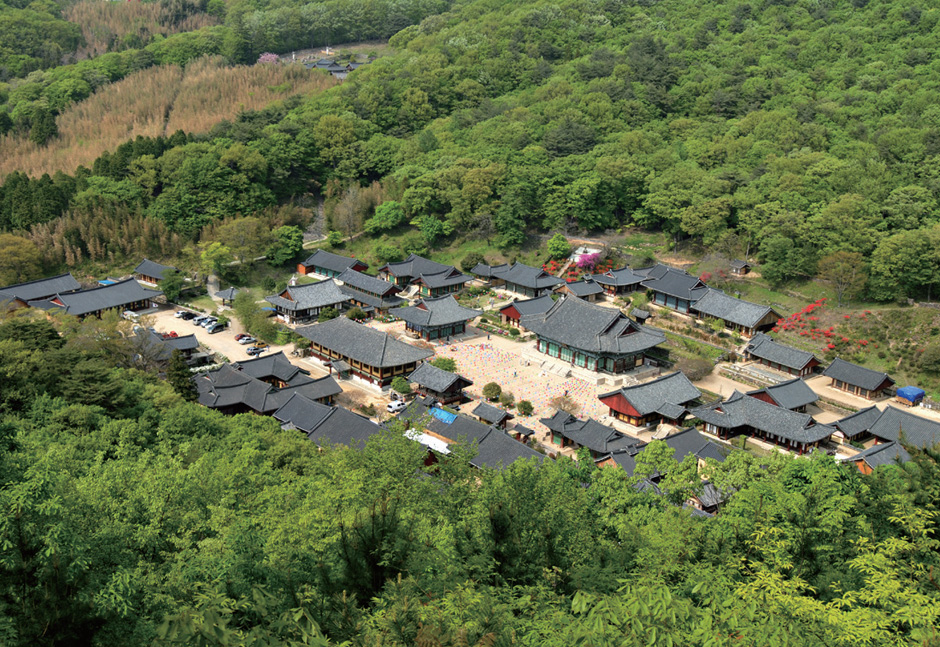
Actually, the two temples in Jogyesan, Songgwangsa and Seonamsa is more famous than the mountain itself. Lot's of noble Buddhist masters are from Songgwangsa, and it has become one of the three most treasured temples of Korea.
Seonunsan (Gochang)
| Location | 전라북도 고창군 아산면 선운사로 250 |
| Height | 336m |
| Difficulty | ☆☆★★★ |
| Starting Point | Gochang Bus Terminal → Seonunsa Terminal |
| Features | Seonunsa Temple |
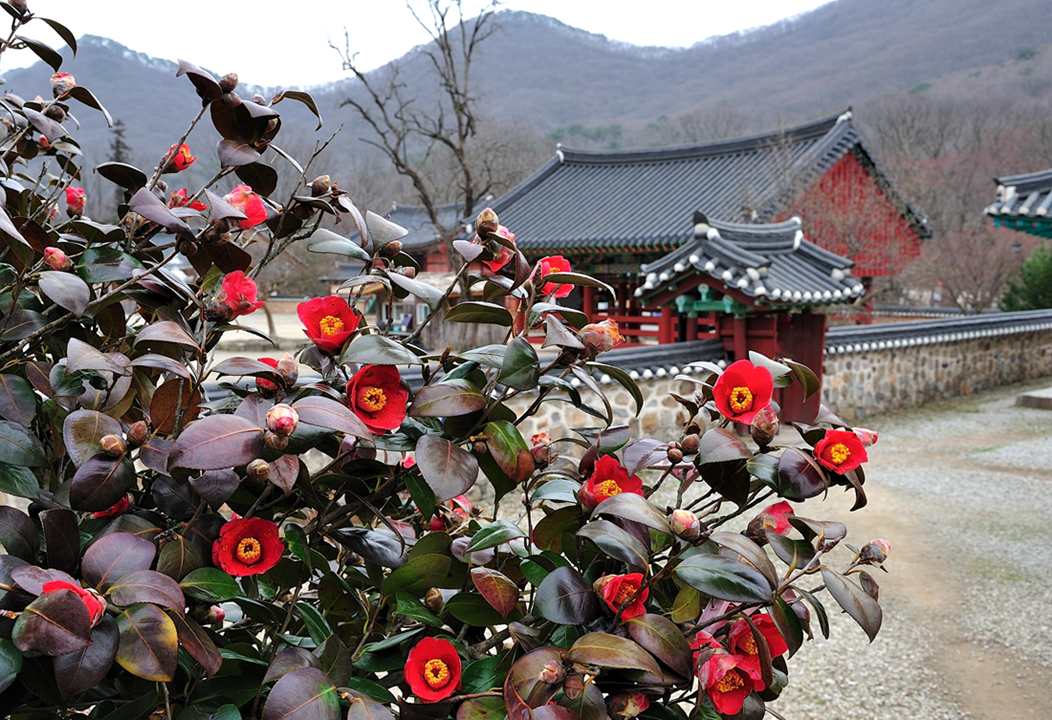
You'll go through Seonunsa Temple if you visit Seonunsan, and the temple is known for its beautiful camellia flower field. The mountain itself is beautiful with lots of wildflowers and a perfect place for a light hiking to refresh your body and mind.
Chuwolsan (Damyang)
| Location | 전라남도 담양군 용면 |
| Height | 731m |
| Difficulty | ☆☆★★★ |
| Starting Point | Damyang Bus Terminal → Chuwolsan Terminal |
| Features | Maple Tree Forest |
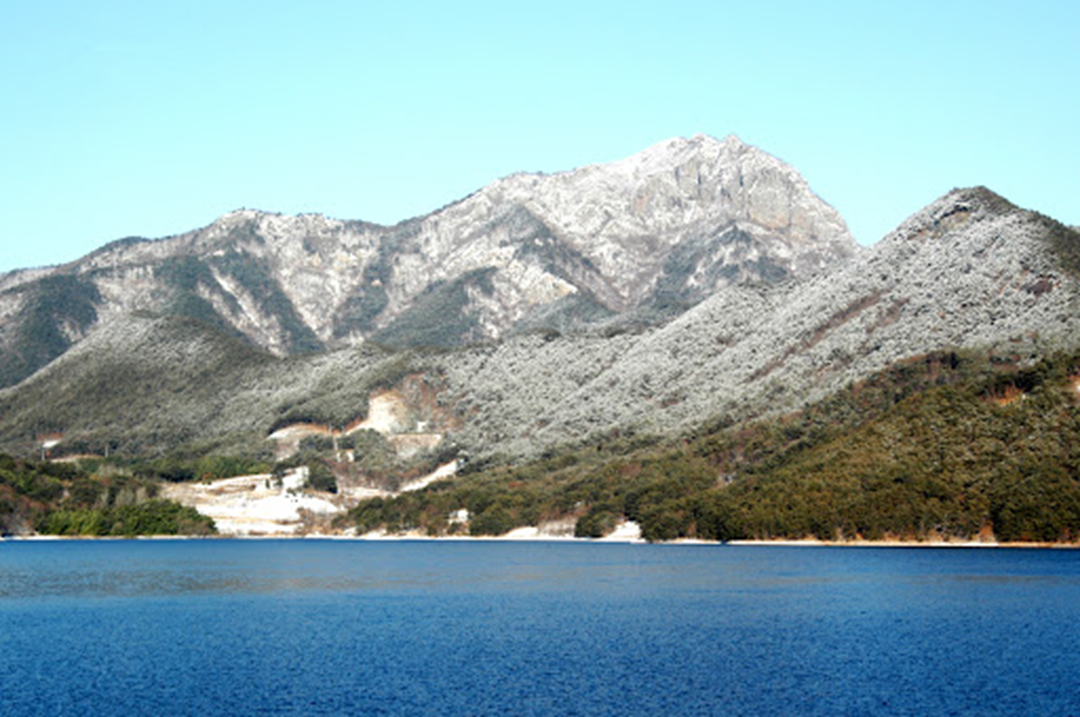
Chuwolsan's name means that the peak is so high that it would touch the sky. It's a tough climb to the top, but once you get to the top, you can see the Damyang Lake's beautiful sight. Also, you can enjoy the most beautiful autumn mountain landscape in Jeolla-do.
Wolchulsan (Yeongam)
| Location | 전라남도 영암군 영암읍 |
| Height | 809m |
| Difficulty | ☆★★★★ |
| Starting Point | Yeongam Bus Terminal → Cheonhwangsa Terminal |
| Features | Muwisa Temple |
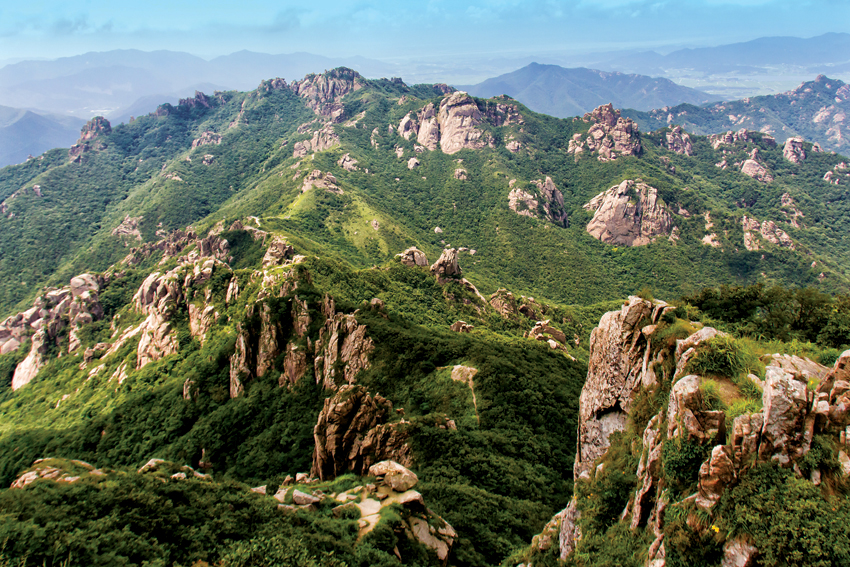
Wolchulsan is the toughest mountain to climb in Jeolla-do. Its trails to the top are relatively short, but it also means that Wolchulsan has the steepest slopes. The ridges are rocky, so you should watch where you are stepping. It might be a relatively short climb, but always be aware.
Mudeungsan (Gwangju)
| Location | 광주광역시 금곡동 |
| Height | 1,187m |
| Difficulty | ☆☆☆★★ |
| Starting Point | Gwangju Songjeong Station → Mudeungsan National Park Terminal |
| Features | Jusangjeolli Cliff (Columnar Joint) |
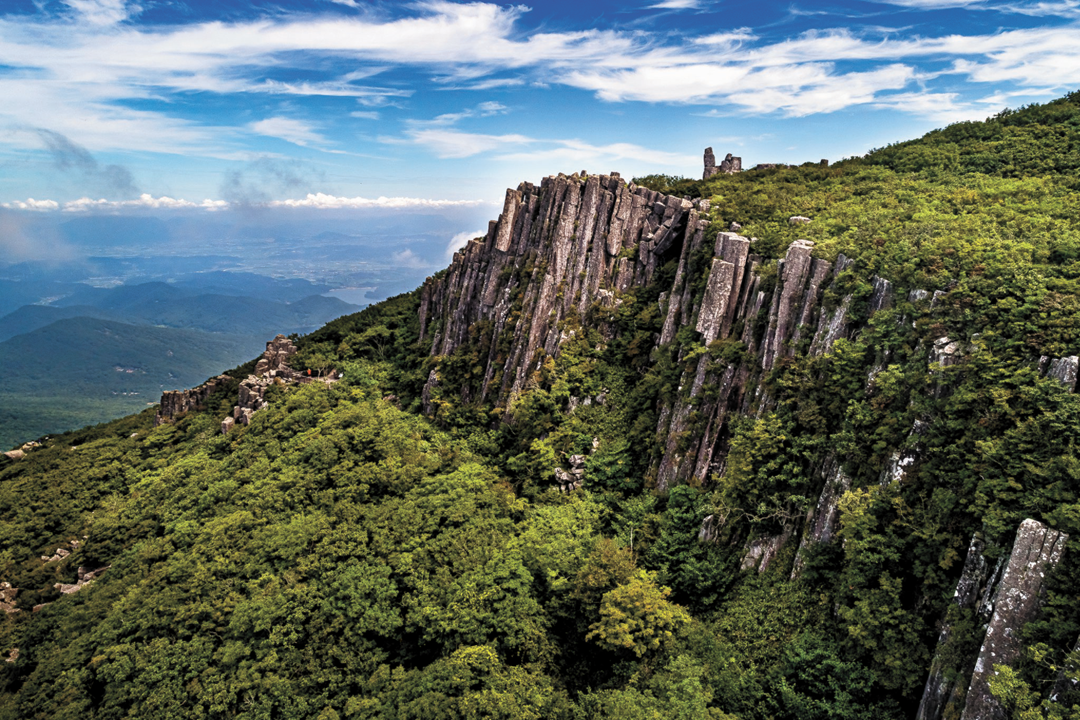
Mudeungsan is the most significant landmark of Gwangju. It is located right next to the downtown area, and you can see it from anywhere in the city. On the top, there are columnar joints that you can find in Jeju Island. You can watch the whole Gwangju city that is also known as the city of lights.
GYEONGSANG-DO
Mountains in Gyeongsang-do are not just beautiful but have rich histories and cultural meanings. You can find many old temples and relics that date back to the Shilla dynasty in the mountains of Gyeongsang-do.
| Location | 경상남도 산청군 시천면 |
| Height | 1,915m |
| Difficulty | ☆☆★★★ |
| Starting Point | Dongseoul Bus Terminal → Jirisan Baekmudong Terminal |
| Features | Cheonwangbong, Nogodan |
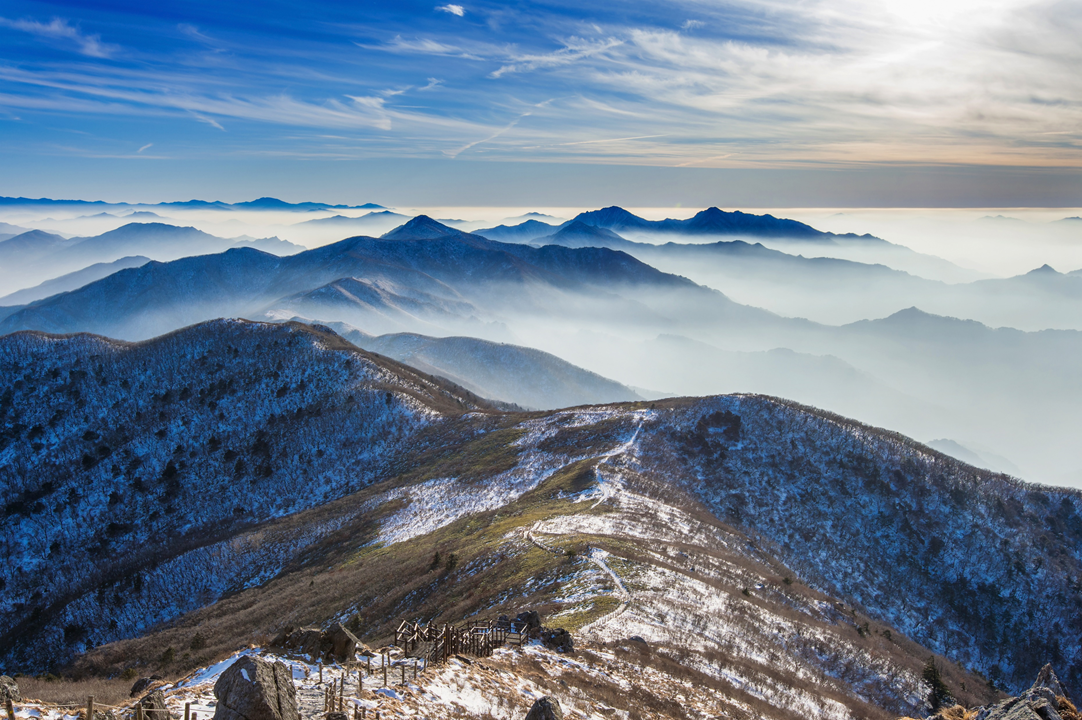
Jirisan was regarded as a holy mountain by the locals historically and has become the first national park in Korea. It is the second-highest mountain in South Korea and covers a large area from Gyeongsang-do to Jeolla-do.
There are many courses to climb, and some mountain lovers take the 4days course to cross country.
Songnisan (Sangju)
| Location | 경상북도 상주시 화북면 |
| Height | 1,058m |
| Difficulty | ☆★★★★ |
| Starting Point | Cheongju Terminal → Hwabuk Terminal → Songnisan Terminal |
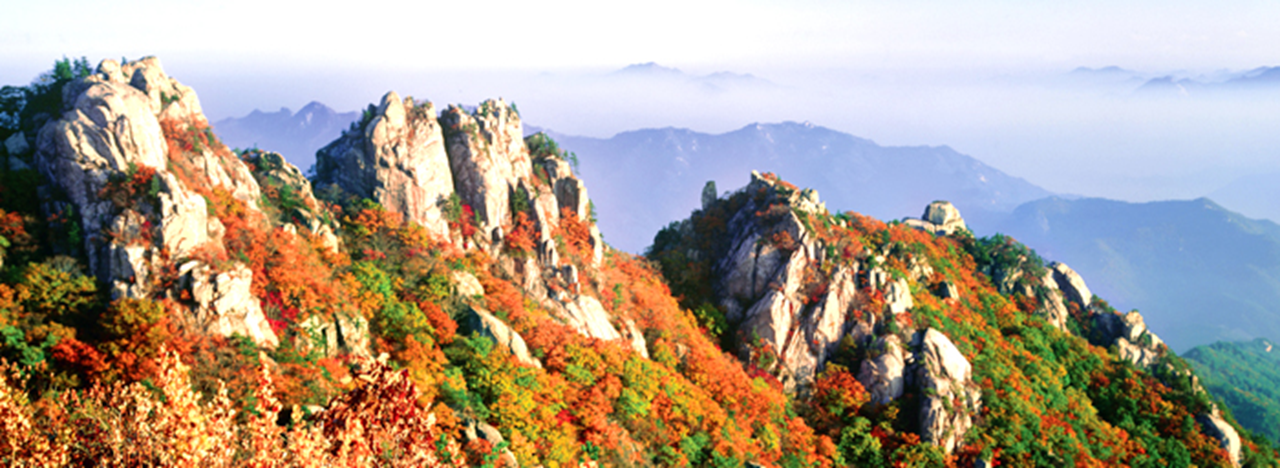
Songnisan has a well-preserved natural environment even compared to the mountains on the list. It has the most beautiful landscape in autumn when all trees are coloured in red and yellow. In Beopjusa there is Korea's largest statue of Buddha.
Palgongsan (Gunwi)
| Location | 경상북도 군위군 부계면 |
| Height | 1,193m |
| Difficulty | ☆★★★★ |
| Starting Point | Dongdaegu Station → Donghwasa Terminal |
| Features | Gatbawi Rock |
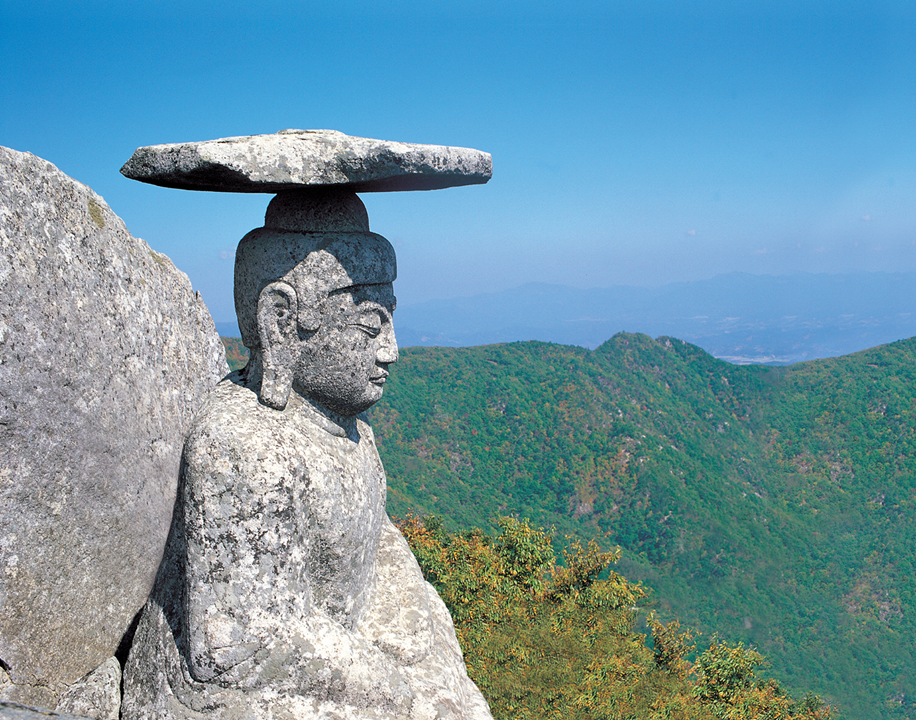
Palgongsan spreads from Daegu to many cities in Gyeongsangdo. It has many temples with a long history that dates back to the Three Kingdoms Era. On the top of the mountain, you can find this stone sculpture of Buddha with a gat(Korean hat) on.
| Location | 경상남도 남해군 상주면 |
| Height | 681m |
| Difficulty | ☆★★★★ |
| Starting Point | Namhae Bus Terminal → Boriam Terminal |
| Features | Boriam |
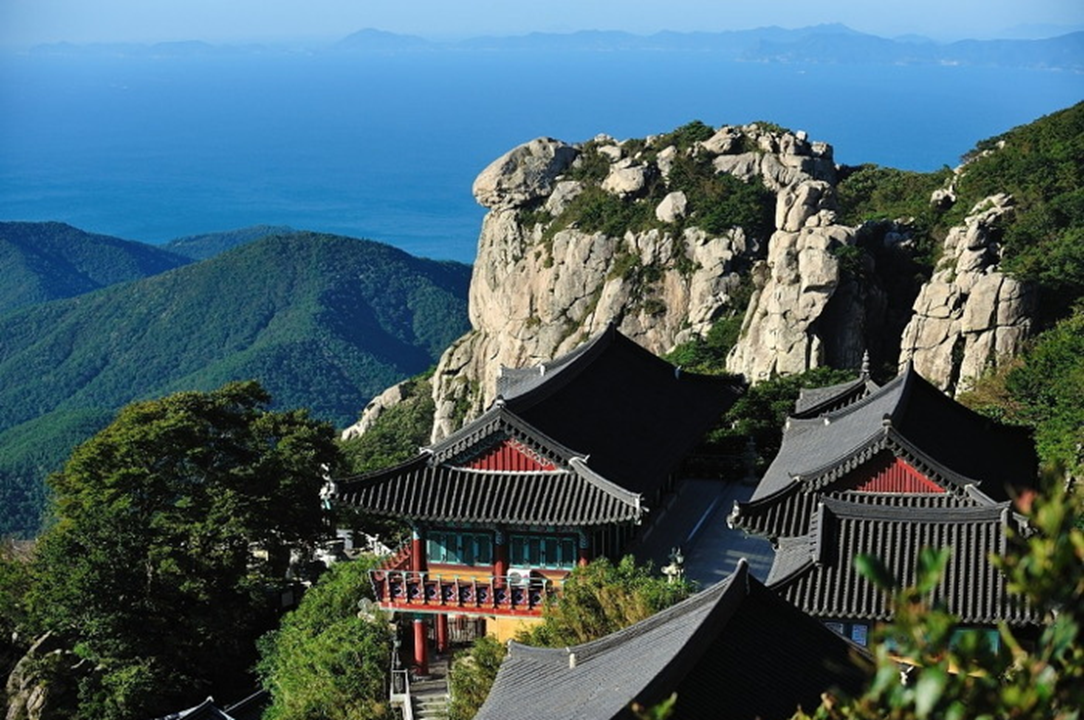
Namhae is one of the most beautiful areas in Gyeongsangdo, where you can enjoy the clean and unique landscape of the Southern Sea. On Geumsan's Boriam Temple, you can appreciate spectacles of the mountain and the sea at once.
| Location | 경상남도 합천군 가야면 |
| Height | 1,430m |
| Difficulty | ★★★★★ |
| Starting Point | Dongdaegu Station → Seongdangmot Station → Haeinsa Terminal |
| Features | Haeinsa |
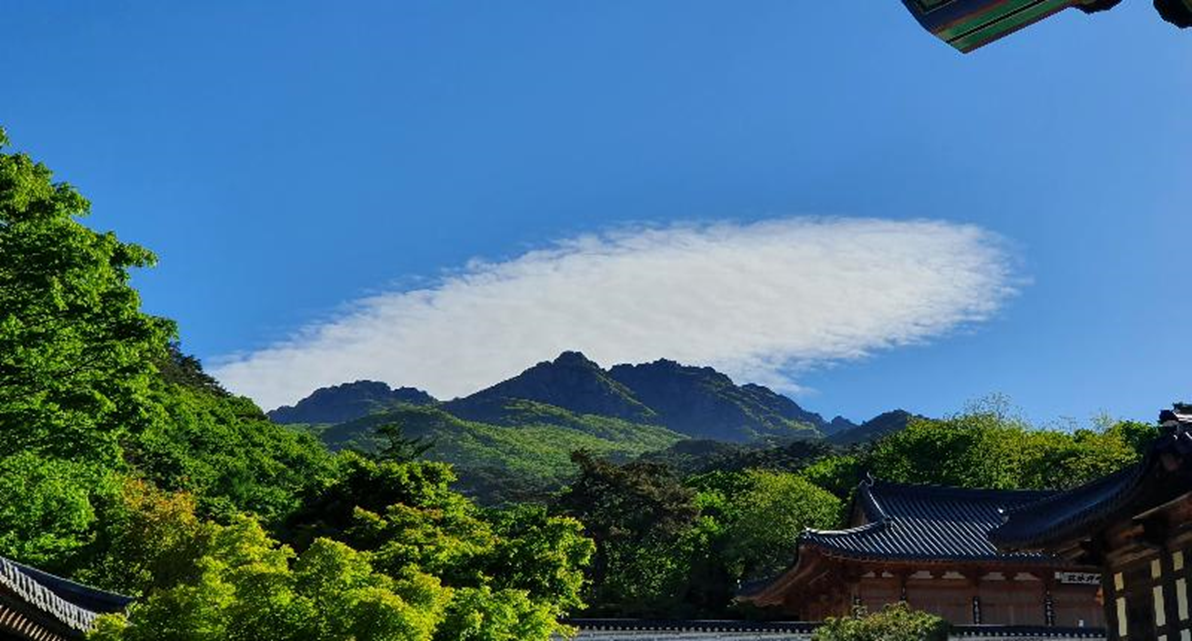
Gayasan is where Haeinsa, the home of the Tripitaka Koreana (Palman Daejanggyeong), is located. You can find a mild slope that starts from Haeinsan, but a way to the top is one of the most difficult trails in Korea, so try to avoid winter or summer seasons.
| Location | 경상북도 경주시 양북면 |
| Height | 745m |
| Difficulty | ☆☆☆★★ |
| Starting Point | Singyeongju Station → Seokguram Terminal |
| Features | Bulguksa, Seokguram |
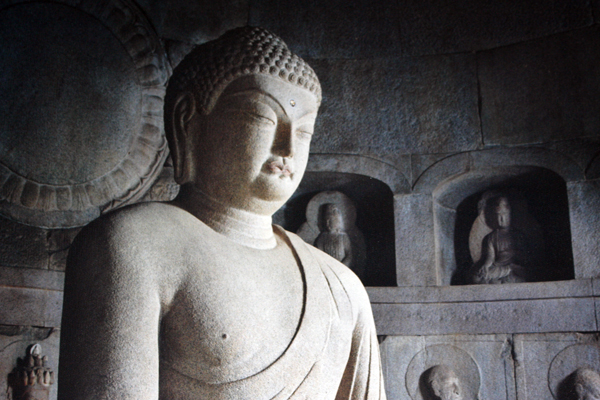
Tohamsan holds two of the most significant cultural artifacts in Korea. Seokguram's statue is the most unique and sophisticated sculpture of Buddha in Korea, and there are many more national treasures you can find in the Tohamsan's temple.
JEJU
Jeju Island has South Korea's highest mountain, Hallasan. There are also oreums and Seongsan Ilchulbong, which is a great place to enjoy peaceful hiking.
Hallasan
| Location | 제주시 오등동 |
| Height | 1,947m |
| Difficulty | ☆☆★★★ |
| Starting Point | Seongpanak Terminal, Gwangeumsa Terminal |
| Features | Baekrokdam |
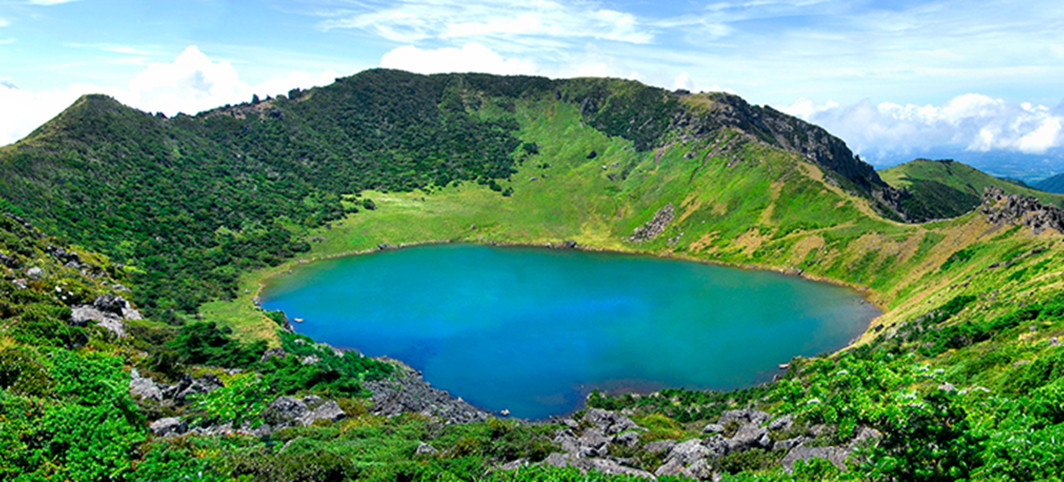
Hallasan is the highest mountain in South Korea that stands 1,947m tall. The whole Jeju Island is part of the mountain, and the mountain is very gently sloped. However, you need to climb for long hours to get to Baekrokdam, the mystical pond on top of Jeju.
If you have any questions or comments about this blog post, please leave a comment below or email us at help@creatrip.com.




